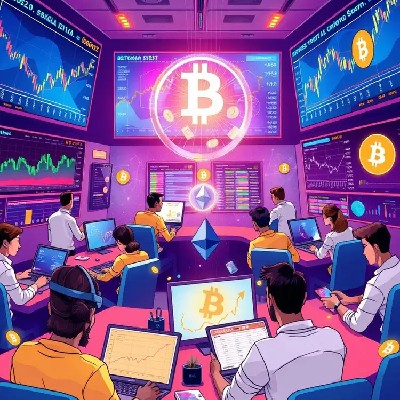Bitget: Global kunlik savdo hajmi bo'yicha top 4!
BTC bozor ulushi61.62%
Bitgetda yangi listinglar : Pi Network
BTC/USDT$85229.67 (+3.21%)Qo'rquv va ochko'zlik Indeksi34(Qo'rquv)
Altcoin mavsumi indeksi:0(Bitcoin mavsumi)
Bozor-oldi ro'yxatida keltirilgan tangalarPAWS,WCTJami spot Bitcoin ETF sof oqimi -$60.6M (1K); +$218.9M (7K).6200 USDT qiymatidagi yangi foydalanuvchilar uchun xush kelibsiz sovg'a to'plami.Hoziroq oling
Bitget ilovasi yordamida istalgan vaqtda va istalgan joyda savdo qiling. Hozir yuklab oling
Bitget: Global kunlik savdo hajmi bo'yicha top 4!
BTC bozor ulushi61.62%
Bitgetda yangi listinglar : Pi Network
BTC/USDT$85229.67 (+3.21%)Qo'rquv va ochko'zlik Indeksi34(Qo'rquv)
Altcoin mavsumi indeksi:0(Bitcoin mavsumi)
Bozor-oldi ro'yxatida keltirilgan tangalarPAWS,WCTJami spot Bitcoin ETF sof oqimi -$60.6M (1K); +$218.9M (7K).6200 USDT qiymatidagi yangi foydalanuvchilar uchun xush kelibsiz sovg'a to'plami.Hoziroq oling
Bitget ilovasi yordamida istalgan vaqtda va istalgan joyda savdo qiling. Hozir yuklab oling
Bitget: Global kunlik savdo hajmi bo'yicha top 4!
BTC bozor ulushi61.62%
Bitgetda yangi listinglar : Pi Network
BTC/USDT$85229.67 (+3.21%)Qo'rquv va ochko'zlik Indeksi34(Qo'rquv)
Altcoin mavsumi indeksi:0(Bitcoin mavsumi)
Bozor-oldi ro'yxatida keltirilgan tangalarPAWS,WCTJami spot Bitcoin ETF sof oqimi -$60.6M (1K); +$218.9M (7K).6200 USDT qiymatidagi yangi foydalanuvchilar uchun xush kelibsiz sovg'a to'plami.Hoziroq oling
Bitget ilovasi yordamida istalgan vaqtda va istalgan joyda savdo qiling. Hozir yuklab oling

Tanga bilan bog'liq
Narx kalkulyatori
Narxlar tarixi
Narx bashorati
Texnik tahlil
Tanga sotib olish bo'yicha qo'llanma
Kripto toifasi
Foyda kalkulyatori

AI Protocol narxAI
Ro'yxatga kiritilmagan
Kotirovka valyutasi:
UZS
Ma'lumotlar uchinchi tomon provayderlaridan olinadi. Ushbu sahifa va taqdim etilgan ma'lumotlar hech qanday aniq kriptovalyutani tasdiqlamaydi. Ro'yxatga olingan tangalar bilan savdo qilishni xohlaysizmi? Bu yerni bosing
so'm29,950.05+4.15%1D
Narx grafigi
Oxirgi yangilanish: 2025-04-01 21:22:31(UTC+0)
Bozor kapitali:--
To’liq suyultirilgan bozor kapitali:--
Hajm (24s):so'm1,539,364,406.44
24s hajm / bozor qiymati:0.00%
24s yuqori:so'm31,143.65
24s past:so'm27,367.3
Hamma vaqtdagi eng yuqori:so'm36,364.49
Hamma vaqtdagi eng past:so'm26,491.62
Aylanma ta'minot:-- AI
Jami ta'minot:
500,000,000AI
Aylanma tezligi:0.00%
Maksimal ta'minot:
500,000,000AI
BTC'dagi narx:0.{4}2716 BTC
ETH'dagi narx:0.001209 ETH
BTC bozor kapitallashuvidagi narxi:
--
ETH bozor kapitallashuvidagi narxi:
--
Shartnomalar:--
Bugun AI Protocol haqida qanday fikrdasiz?
Izoh: Ushbu ma'lumot faqat ma'lumot uchun.
AI Protocolning bugungi narxi
AI Protocol ning joriy narxi bugungi kunda (AI / UZS) uchun so'm29,950.05, joriy kapitallashuvi so'm0.00 UZS. 24 soatlik savdo hajmi so'm1.54B UZS. AI dan UZS gacha, narx real vaqtda yangilanadi. AI Protocol oxirgi 24 soat ichida 4.15%. Muomaladagi hajm 0 .
AIning eng yuqori narxi qancha?
AI barcha vaqtlardagi eng yuqori ko'rsatkichga ega (ATH) so'm36,364.49 bo'lib, 2025-03-27 tomonidan qayd etilgan.
AI ning eng past narxi qancha?
AI barcha vaqtlardagi eng past ko'rsatkichga ega (ATL) so'm26,491.62, 2025-03-31 da qayd etilgan.
AI Protocol narx bashorati
2026 da AI narxi qanday bo'ladi?
AI tarixiy narx bajarilishini bashorat qilish modeli asosida AI narxi 2026 da so'm28,763.93 ga yetishi prognoz qilinmoqda.
2031 da AI narxi qanday bo'ladi?
2031 da AI narxi +40.00% ga o'zgarishi kutilmoqda. 2031 oxiriga kelib, AI narxi so'm51,218.74 ga yetishi prognoz qilinmoqda, jami ROI +72.19%.
AI Protocol narx tarixi (UZS)
AI Protocol narxi o'tgan yil davomida -11.84% ni tashkil qiladi. O'tgan yildagi ning UZS dagi eng yuqori narxi so'm36,364.49 va o'tgan yildagi ning UZS dagi eng past narxi so'm26,491.62 edi.
VaqtNarx o'zgarishi (%) Eng past narx
Eng past narx Eng yuqori narx
Eng yuqori narx 
 Eng past narx
Eng past narx Eng yuqori narx
Eng yuqori narx 
24h+4.15%so'm27,367.3so'm31,143.65
7d-6.91%so'm26,491.62so'm36,364.49
30d-5.09%so'm26,491.62so'm36,364.49
90d-11.84%so'm26,491.62so'm36,364.49
1y-11.84%so'm26,491.62so'm36,364.49
Hamma vaqt0.00%so'm26,491.62(2025-03-31, Kecha )so'm36,364.49(2025-03-27, 6 kun oldin )
AI Protocol bozor ma’lumotlari
AI Protocolning bozor qiymati tarixi
AI Protocol kontsentratsiya bo'yicha xoldinglar
Kitlar
Investorlar
Chakana savdo
Saqlash vaqti bo'yicha AI Protocol manzil
Xolderlar
Kruizerlar
Treyderlar
Jonli coinInfo.name (12) narx grafigi

AI Protocol reyting
Jamiyatning o'rtacha baholari
4.4
Ushbu kontent faqat ma'lumot olish uchun mo'ljallangan.
AI mahalliy valyutaga
1 AI dan MXN$47.11 AI dan GTQQ17.871 AI dan CLP$2,191.951 AI dan UGXSh8,463.891 AI dan HNLL59.261 AI dan ZARR42.841 AI dan TNDد.ت7.21 AI dan IQDع.د3,034.221 AI dan TWDNT$76.951 AI dan RSDдин.251.481 AI dan DOP$145.071 AI dan MYRRM10.261 AI dan GEL₾6.421 AI dan UYU$97.661 AI dan MADد.م.22.331 AI dan AZN₼3.941 AI dan OMRر.ع.0.891 AI dan SEKkr23.191 AI dan KESSh299.241 AI dan UAH₴95.86
- 1
- 2
- 3
- 4
- 5
Oxirgi yangilanish: 2025-04-01 21:22:31(UTC+0)
AI Protocol yangiliklar

ETH 1900 USDT dan oshib, 24 soatda 5.45% ga ko'tarildi
Bitget•2025-03-28 23:06

BTC 84,000 USDT dan pastga tushdi
Bitget•2025-03-28 15:06

Bitget innovatsiyalar va mem zonasida Banana For Scale (BANANAS31) ro'yxatini taqdim qiladi!
Bitget Announcement•2025-03-26 10:40

Solananing on-chain AI iqtisodiy platformasi, PioneerAI, ishga tushishga yaqin turibdi
Bitget•2025-03-21 12:42

Bitget siren (SIREN) ro'yxatini taqdim qiladi. Keling va 1,649,666 SIREN ulushini oling!
Bitget Announcement•2025-03-21 11:00
Ko'proq sotib oling
SAVOL-JAVOBLAR
AI Protocol ning hozirgi narxi qancha?
AI Protocolning jonli narxi (AI/UZS) uchun so'm29,950.05, joriy bozor qiymati so'm0 UZS. Kripto bozorida 24/7 doimiy faoliyat tufayli AI Protocol qiymati tez-tez o'zgarib turadi. AI Protocolning real vaqtdagi joriy narxi va uning tarixiy maʼlumotlari Bitget’da mavjud.
AI Protocol ning 24 soatlik savdo hajmi qancha?
Oxirgi 24 soat ichida AI Protocol savdo hajmi so'm1.54B.
AI Protocolning eng yuqori koʻrsatkichi qancha?
AI Protocolning eng yuqori ko‘rsatkichi so'm36,364.49. Bu AI Protocol ishga tushirilgandan beri eng yuqori narx hisoblanadi.
Bitget orqali AI Protocol sotib olsam bo'ladimi?
Ha, AI Protocol hozirda Bitget markazlashtirilgan birjasida mavjud. Batafsil koʻrsatmalar uchun foydali qanday sotib olinadi qoʻllanmamizni koʻrib chiqing.
AI Protocol ga sarmoya kiritish orqali barqaror daromad olsam bo'ladimi?
Albatta, Bitget savdolaringizni avtomatlashtirish va daromad olish uchun aqlli savdo botlari bilan strategik savdo platformasi ni taqdim etadi.
Eng past toʻlov bilan AI Protocol ni qayerdan sotib olsam boʻladi?
strategik savdo platformasi endi Bitget birjasida mavjud ekanligini ma’lum qilishdan mamnunmiz. Bitget treyderlar uchun foydali investitsiyalarni ta'minlash uchun sanoatning yetakchi savdo to'lovlari va tubanligini taklif qiladi.
Qayerdan kripto sotib olsam bo'ladi?
Video bo'limi — tezkor tekshiruv, tezkor savdo

Bitgetda shaxsni tasdqilashni qanday yakunlash va o'zingizni firibgarlikdan himoya qilish kerak
1. Bitget hisobingizga kiring.
2. Agar siz Bitgetda yangi bo'lsangiz, hisob yaratish bo'yicha o'quv qo'llanmamizni tomosha qiling.
3. Profilingiz belgisiga kursorni olib keling, "Tasdiqlanmagan" tugmasini bosing va "Tasdiqlash" tugmasini bosing.
4. Chiqaruvchi mamlakat yoki mintaqa va ID turini tanlang va ko'rsatmalarga amal qiling.
5. O'zingizning xohishingizga ko'ra "Mobil tekshiruv" yoki "Kompyuter" ni tanlang.
6. Ma'lumotlaringizni kiriting, shaxsingizni tasdiqlovchi hujjat nusxasini yuboring va selfi oling.
7. Arizangizni yuboring va bo'ldi, siz shaxsingizni tasdiqlashni tugatdingiz!
Kriptovalyutalarga sarmoya kiritish, jumladan Bitgetda onlayn AI Protocol xarid qilish xavflarni o‘z ichiga oladi. Bitget AI Protocol sotib olishning oson va qulay usullarini taklif etadi va birjada ko'rsatilgan kriptovalyuta haqida to'liq ma'lumot berishga harakat qiladi. Biroq, biz AI Protocol xaridingizdan kelib chiqadigan natijalar uchun javobgar emasmiz. Taqdim etilgan barcha ma'lumotlar xarid uchun tavsiya etilmaydi.
Bitget Insaytlari

Sureshkumar45y
3S
Investing $1000 in crypto requires a thoughtful and diversified approach. Here's a general framework:
Crypto Asset Allocation (60% Large-Cap / 20% Mid-Cap / 20% Small-Cap & Altcoins)
1. Large-Cap (60%):
- 30% Bitcoin (BTC)
- 15% Ethereum (ETH)
- 10% Other Large-Cap Cryptos (e.g., LTC, BCH)
- 5% Crypto Index Funds or ETFs
2. Mid-Cap (20%):
- 10% Polkadot (DOT)
- 5% Solana (SOL)
- 5% Chainlink (LINK)
3. Small-Cap & Altcoins (20%):
- 5% Decentralized Finance (DeFi) Tokens (e.g., Uniswap, Aave)
- 5% Gaming and NFT Tokens (e.g., Enjin, Flow)
- 5% Other Small-Cap and Altcoins (e.g., Near Protocol, Ocean Protocol)
-5% high risk meme coins- pepe; doge ;shib
Risk Management:
1. Diversification: Spread investments across different asset classes and market capitalizations.
2. Position Sizing: Limit individual position sizes to 5-10% of the overall portfolio.
3. Stop-Loss Orders: Consider implementing stop-loss orders to limit potential losses.
Ongoing Monitoring:
1. Regular Portfolio Reviews: Schedule regular reviews (e.g., quarterly) to assess performance and rebalance the portfolio.
2. Market and Regulatory Updates: Stay informed about market trends, regulatory changes, and security best practices.
Please remember that investing in crypto is high-risk and requires careful consideration. This framework is for general information purposes only and should not be considered personalized investment advice. It's essential to consult with a financial advisor or conduct your own research before making investment decisions.
Thank you...🙂
$BTC $ETH $SOL $PI $AI $XRP $BGB $BNB $DOGE $SHIB $FLOKI $BONK $PARTI $BROCCOLI $U2U $WUF $SUNDOG $MEME $ADA $CATS
SUNDOG+2.62%
BTC+3.24%
Mahnoor-Baloch007
3S
AI agents and AI are related but distinct concepts in the field of artificial intelligence.
AI (Artificial Intelligence)
1. Definition: AI refers to the broad field of study focused on creating intelligent machines that can perform tasks that typically require human intelligence.
2. Characteristics: AI systems can process and analyze large amounts of data, learn from experiences, and make decisions based on that data.
3. Examples: AI-powered chatbots, image recognition systems, and natural language processing tools.
AI Agents
1. Definition: AI agents are a specific type of AI system that can autonomously perform tasks on behalf of a user or another system.
2. Characteristics: AI agents have the ability to design their own workflow, utilize available tools, and interact with external environments to achieve complex goals.
3. Examples: AI-powered trading bots, autonomous vehicles, and smart home systems.
Key Differences
1. Autonomy: AI agents have a higher level of autonomy compared to traditional AI systems, allowing them to make decisions and take actions independently.
2. Interactivity: AI agents can interact with their environment and other systems, whereas traditional AI systems may only process data internally.
3. Proactivity: AI agents can anticipate and prevent problems, whereas traditional AI systems may only react to problems after they occur.
4. Complexity: AI agents often require more complex decision-making and problem-solving capabilities compared to traditional AI systems.
In summary, while AI refers to the broader field of artificial intelligence, AI agents are a specific type of AI system that can autonomously perform tasks, interact with their environment, and make decisions independently.
Thank you...🙂
$BTC $ETH $SOL $PI $XRP $DOGE $SHIB $SUNDOG $MEME $AI $XAI $PEPECOIN $PIPPIN $ORAI $ETC $WHY $U2U
SUNDOG+2.62%
BTC+3.24%

Crypto_inside
12S
Day trading ❌ Swing trading. 🧐😵💫
Day trading and swing trading are two popular trading strategies used in financial markets. While both strategies aim to profit from market fluctuations, they differ in their approach, time frame, and risk management.
Day Trading:
1. Intra-day trading: Day traders buy and sell securities within a single trading day.
2. Closing positions before market close: Day traders close all positions before the market closes to avoid overnight risks.
3. Frequent trading: Day traders make multiple trades throughout the day.
4. Technical analysis: Day traders rely heavily on technical analysis, using charts and indicators to identify trading opportunities.
5. Risk management: Day traders use stop-loss orders and position sizing to manage risk.
Swing Trading:
1. Short-term trading: Swing traders hold positions for a shorter period than investors, typically from a few days to a few weeks.
2. Holding positions overnight: Swing traders may hold positions overnight, exposing themselves to overnight risks.
3. Less frequent trading: Swing traders make fewer trades than day traders, as they hold positions for longer periods.
4. Combination of technical and fundamental analysis: Swing traders use a combination of technical and fundamental analysis to identify trading opportunities.
5. Risk management: Swing traders use stop-loss orders, position sizing, and risk-reward ratios to manage risk.
Key Differences:
1. Time frame: Day traders hold positions for minutes or hours, while swing traders hold positions for days or weeks.
2. Trading frequency: Day traders make multiple trades throughout the day, while swing traders make fewer trades.
3. Risk management: Day traders focus on managing risk through quick trade execution and tight stop-loss orders, while swing traders use a combination of risk management strategies.
4. Analysis: Day traders rely heavily on technical analysis, while swing traders use a combination of technical and fundamental analysis.
Choosing Between Day Trading and Swing Trading:
1. Trading style: Day trading suits traders who can dedicate several hours a day to monitoring markets and making trades. Swing trading suits traders who prefer to hold positions for longer periods.
2. Risk tolerance: Day trading involves higher risk due to the fast-paced nature of the markets. Swing trading involves lower risk, as positions are held for longer periods.
3. Market analysis: Day traders rely on technical analysis, while swing traders use a combination of technical and fundamental analysis.
4. Time commitment: Day trading requires a significant time commitment, while swing trading requires less time.
Thank you...🙂
$BTC $ETH $SOL $PI $AI $XRP $DOGE $SHIB $BONK $COQ $CATS $BGB $BNB $U2U $WUF $WHY $SUNDOG $PARTI $CEC $BLUR
SUNDOG+2.62%
BTC+3.24%

Crypto_inside
12S
What is 'Position trading'..🤔🤔??
Position trading is a long-term trading strategy that involves holding a position in a security for an extended period, typically weeks, months, or even years. This approach focuses on capturing significant price movements and trends, rather than trying to time the market or make quick profits.
Key Characteristics:
1. Long-term focus: Position traders hold positions for an extended period, riding out market fluctuations.
2. Trend following: Position traders aim to identify and follow long-term trends in the market.
3. Fundamental analysis: Position traders often rely on fundamental analysis, examining a company's financials, management, and industry trends.
4. Risk management: Position traders must manage risk carefully, as large price movements can result in significant losses.
Position Trading Strategies:
1. Trend identification: Position traders use technical indicators and chart patterns to identify long-term trends.
2. Breakout trading: Position traders buy or sell when a security breaks out of a established trading range.
3. Mean reversion: Position traders bet on prices reverting to their historical means.
Advantages:
1. Reduced transaction costs: Position traders incur lower transaction costs due to fewer trades.
2. Less emotional stress: Position traders are less affected by short-term market volatility.
3. *Potential for significant gains*: Position traders can capture significant price movements and trends.
Disadvantages:
1. Market risk: Position traders are exposed to market risk, as large price movements can result in significant losses.
2. Opportunity cost: Position traders may miss out on other investment opportunities while holding a long-term position.
3. Requires patience and discipline: Position traders must be patient and disciplined, as it can take time for a trade to develop.
Position Trading vs. Day Trading:
1. Trade duration: Position traders hold positions for weeks, months, or years, while day traders close their positions within a single trading day.
2. Trade frequency: Position traders make fewer trades, while day traders make multiple trades throughout the day.
3. Risk management: Position traders focus on managing risk through position sizing and stop-loss orders, while day traders focus on managing risk through quick trade execution and tight stop-loss orders.
Position trading requires a unique combination of fundamental analysis, technical analysis, and risk management. While it can be a profitable strategy, it's essential to carefully consider the risks and challenges involved.
Thank you...🙂
$BTC $ETH $SOL $PI $AI $XRP $BGB $BNB $DOGE $SHIB $BONK $FLOKI $U2U $WUF $ORDER $SUNDOG $TRX $WHY
SUNDOG+2.62%
BTC+3.24%

Crypto_inside
12S
What is Scalping...🤔🤔??
Scalping is a trading strategy that involves making multiple small trades in a short period, typically seconds or minutes, to take advantage of small price movements. The goal of scalping is to accumulate small profits from each trade, which can add up to significant gains over time.
Key Characteristics:
1. Short-term focus: Scalping involves holding trades for a very short period.
2. High-frequency trading: Scalpers make multiple trades in rapid succession.
3. Small profit targets: Scalpers aim to make small profits from each trade.
4. Risk management: Scalpers must manage risk carefully to avoid significant losses.
Scalping Strategies:
1. Trend following: Scalpers follow the trend, making trades in the direction of the market momentum.
2. Range trading: Scalpers buy and sell within a specific price range, taking advantage of oscillations.
3. Mean reversion: Scalpers bet on prices reverting to their historical means.
Tools and Techniques:
1. Technical analysis: Scalpers use technical indicators, such as moving averages and RSI, to identify trading opportunities.
2. Chart patterns: Scalpers recognize chart patterns, such as triangles and wedges, to anticipate price movements.
3. Order flow analysis: Scalpers analyze order flow to gauge market sentiment and identify potential trading opportunities.
Risks and Challenges:
1. Market volatility: Scalping involves trading in volatile markets, which can result in significant losses.
2. Commissions and fees: Scalpers incur high transaction costs due to frequent trading.
3. Emotional stress: Scalping can be emotionally demanding, requiring intense focus and quick decision-making.
Scalping vs. Day Trading:
1. Trade duration: Scalping involves holding trades for seconds or minutes, while day trading involves holding trades for hours or until the market closes.
2. Trade frequency: Scalpers make multiple trades in rapid succession, while day traders typically make fewer trades.
Scalping requires a unique combination of technical analysis, risk management, and mental discipline. While it can be a profitable strategy, it's essential to carefully consider the risks and challenges involved.
Thank you...🙂
$BTC $ETH $SOL $PI $AI $XRP $DOGE $SHIB $BONK $COQ $U2U $WUF $ADA $WHY $SUNDOG $PARTI $CATS
SUNDOG+2.62%
BTC+3.24%
Shunga o'xshash aktivlar
Mashhur kriptovalyutalar
Bozor kapitali bo'yicha eng yaxshi 8 kriptovalyuta tanlovi.
Yaqinda qo’shildi
Eng so’nggi qo’shilgan kriptovalyutalar.
Taqqoslanadigan bozor kapitali
Bitget aktivlari orasida ushbu 8 tasi bozor qiymati bo'yicha AI Protocol ga eng yaqin hisoblanadi.

































